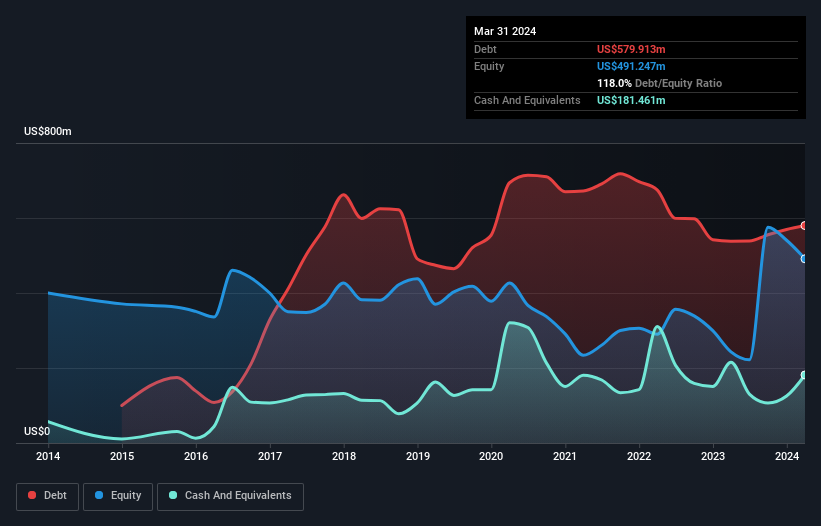- United States
- /
- Entertainment
- /
- NasdaqGS:BATR.K
Is Atlanta Braves Holdings (NASDAQ:BATR.K) Using Too Much Debt?

Some say volatility, rather than debt, is the best way to think about risk as an investor, but Warren Buffett famously said that 'Volatility is far from synonymous with risk.' It's only natural to consider a company's balance sheet when you examine how risky it is, since debt is often involved when a business collapses. We can see that Atlanta Braves Holdings, Inc. (NASDAQ:BATR.K) does use debt in its business. But should shareholders be worried about its use of debt?
When Is Debt A Problem?
Debt and other liabilities become risky for a business when it cannot easily fulfill those obligations, either with free cash flow or by raising capital at an attractive price. If things get really bad, the lenders can take control of the business. While that is not too common, we often do see indebted companies permanently diluting shareholders because lenders force them to raise capital at a distressed price. Of course, the upside of debt is that it often represents cheap capital, especially when it replaces dilution in a company with the ability to reinvest at high rates of return. When we think about a company's use of debt, we first look at cash and debt together.
See our latest analysis for Atlanta Braves Holdings
How Much Debt Does Atlanta Braves Holdings Carry?
As you can see below, at the end of March 2024, Atlanta Braves Holdings had US$579.9m of debt, up from US$538.3m a year ago. Click the image for more detail. However, because it has a cash reserve of US$181.5m, its net debt is less, at about US$398.5m.

A Look At Atlanta Braves Holdings' Liabilities
According to the last reported balance sheet, Atlanta Braves Holdings had liabilities of US$359.9m due within 12 months, and liabilities of US$751.1m due beyond 12 months. On the other hand, it had cash of US$181.5m and US$40.2m worth of receivables due within a year. So its liabilities total US$889.2m more than the combination of its cash and short-term receivables.
Atlanta Braves Holdings has a market capitalization of US$2.71b, so it could very likely raise cash to ameliorate its balance sheet, if the need arose. But it's clear that we should definitely closely examine whether it can manage its debt without dilution. There's no doubt that we learn most about debt from the balance sheet. But ultimately the future profitability of the business will decide if Atlanta Braves Holdings can strengthen its balance sheet over time. So if you're focused on the future you can check out this free report showing analyst profit forecasts.
Over 12 months, Atlanta Braves Holdings reported revenue of US$647m, which is a gain of 8.2%, although it did not report any earnings before interest and tax. We usually like to see faster growth from unprofitable companies, but each to their own.
Caveat Emptor
Over the last twelve months Atlanta Braves Holdings produced an earnings before interest and tax (EBIT) loss. Indeed, it lost US$47m at the EBIT level. When we look at that and recall the liabilities on its balance sheet, relative to cash, it seems unwise to us for the company to have any debt. Quite frankly we think the balance sheet is far from match-fit, although it could be improved with time. Another cause for caution is that is bled US$75m in negative free cash flow over the last twelve months. So suffice it to say we do consider the stock to be risky. When analysing debt levels, the balance sheet is the obvious place to start. However, not all investment risk resides within the balance sheet - far from it. For example - Atlanta Braves Holdings has 2 warning signs we think you should be aware of.
If you're interested in investing in businesses that can grow profits without the burden of debt, then check out this free list of growing businesses that have net cash on the balance sheet.
New: Manage All Your Stock Portfolios in One Place
We've created the ultimate portfolio companion for stock investors, and it's free.
• Connect an unlimited number of Portfolios and see your total in one currency
• Be alerted to new Warning Signs or Risks via email or mobile
• Track the Fair Value of your stocks
Have feedback on this article? Concerned about the content? Get in touch with us directly. Alternatively, email editorial-team (at) simplywallst.com.
This article by Simply Wall St is general in nature. We provide commentary based on historical data and analyst forecasts only using an unbiased methodology and our articles are not intended to be financial advice. It does not constitute a recommendation to buy or sell any stock, and does not take account of your objectives, or your financial situation. We aim to bring you long-term focused analysis driven by fundamental data. Note that our analysis may not factor in the latest price-sensitive company announcements or qualitative material. Simply Wall St has no position in any stocks mentioned.
Have feedback on this article? Concerned about the content? Get in touch with us directly. Alternatively, email editorial-team@simplywallst.com
About NasdaqGS:BATR.K
Atlanta Braves Holdings
Through its subsidiary, Braves Holdings, LLC, owns and operates the Atlanta Braves Major League Baseball Club in the United States.
Imperfect balance sheet and overvalued.
Market Insights
Community Narratives



